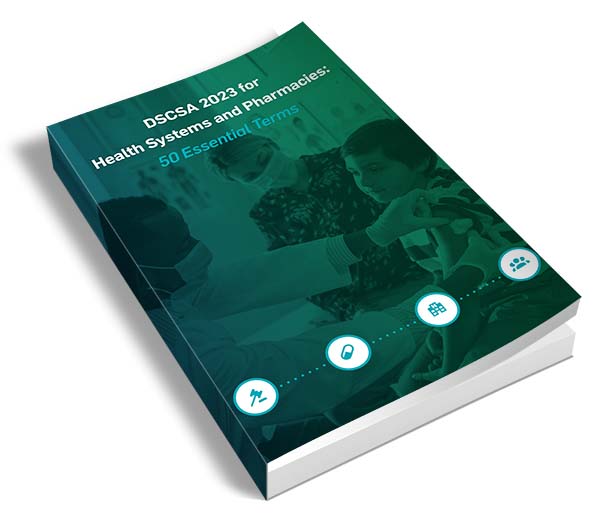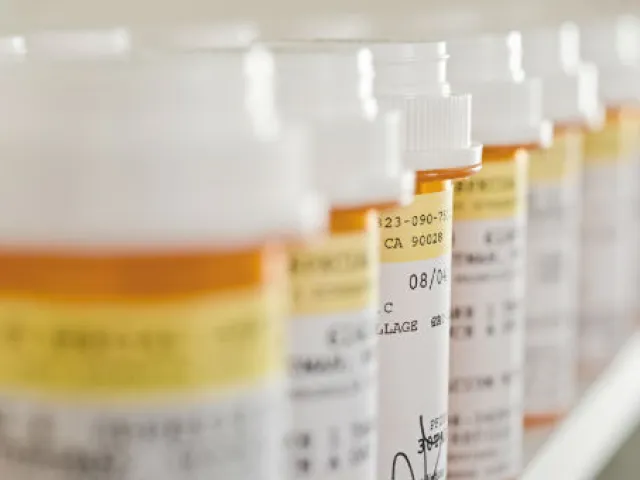Table of contents
The final phase of the Drug Supply Chain Security Act, also known as “DSCSA 2023,” will have a profound effect on dispensing operations—from the receiving dock to the pharmacy shelf—and will require a full-scale effort over the next 24 months to ensure that pharmacies and health systems can meet DSCSA requirements, maintain operational efficiency, and ensure patient safety.
As you prepare to meet DSCSA 2023 requirements, you will see terms that represent important concepts in the industry-wide effort to create a safer, more secure drug supply.
The major provisions of the DSCSA apply to manufacturers, repackagers, wholesale distributors, and many dispensers—primarily pharmacies—and include:
Product identification: The addition of a unique product identifier on certain prescription drug packages.
Unit-level traceability: The ability to provide information about a drug and who handled it each time it is sold in the U.S. market based on its unique product identifier.
Product verification: Establishing systems and processes to verify the product identifier on certain prescription drug packages under certain circumstances.
Detection and response: The quarantine and prompt investigation of a drug that has been identified as suspect, meaning that it may be counterfeit, unapproved, or potentially dangerous.
Notification: Establishing systems and processes to notify the FDA and other stakeholders if an illegitimate drug is found.
As you prepare to meet DSCSA 2023 requirements, you will see terms that represent important concepts in the industry-wide effort to create a safer, more secure drug supply. These 50 terms, in particular, will help pharmacies and health systems understand the critical role they play in that effort.
Accreditation
Accreditation is an agreed-upon process through which to evaluate various credentialing, verification, and tracing solutions and confirm they meet the established minimum expectations set by the Partnership for DSCSA Governance (PDG).
Accreditor(s)
Accreditor(s) are organization(s) that accredit credential issuers (Accredited Credential Issuers) and systems and processes that meet the requirements defined by the Partnership for DSCSA Governance (PDG).
Aggregation
Although the term aggregation is not defined in the DSCSA, it is used by the FDA to describe how enhanced system requirements could be met for 2023. FDA uses aggregation to refer to the process of building a relationship between unique identifiers assigned to packaging containers. For example, a parent-child relationship would exist between the product identifiers for a package or group of packages (the child or children) that are contained in a homogeneous case (the parent).
Examples of data aggregation related to a transaction and the associated shipment of products include:
Packages of the same product that are packed into a homogeneous case: A data file that lists the standardized numerical identifier of the case, as well as the standardized numerical identifiers for each package of product in that case provided by the selling trading partner to the purchasing trading partner.
Multiple homogeneous cases of product on a pallet: A data file that reflects the contents of the pallet, including the individual, unique product identifiers associated with each homogeneous case and/or with packages within the case provided by the selling trading partner to the purchasing trading partner.
Authorized Trading Partner
The term trading partner means:
- A manufacturer, repackager, wholesale distributor, or dispenser from whom a manufacturer, repackager, wholesale distributor, or dispenser accepts direct ownership of a product or to whom a manufacturer, repackager, wholesale distributor, or dispenser transfers direct ownership of a product; or
- A third-party logistics provider from whom a manufacturer, repackager, wholesale distributor, or dispenser accepts direct possession of a product or to whom a manufacturer, repackager, wholesale distributor, or dispenser transfers direct possession of a product.
The term authorized means:
- In the case of a manufacturer or repackager, having a valid registration in accordance with the Federal Food, Drug and Cosmetic Act.
- In the case of a wholesale distributor, having a valid license under State law or section 583 of the DSCSA, in accordance with section 582, and complying with the licensure reporting requirements as amended by the Drug Supply Chain Security Act.
Corporate GLN
A corporate GLN is the Global Location Number that refers to a company as a legal entity. Companies can use a corporate GLN in any context where they need to identify a company as a legal entity. For example, in DSCSA transaction information, companies would use the corporate GLN of the seller and the corporate GLN of the buyer to identify them as parties to the transaction.
Counterfeit
A drug which—or the container or labeling of which, without authorization—bears the trademark, trade name, or other identifying mark, imprint, or device, or any likeness thereof, of a drug manufacturer, processor, packer, or distributor other than the person or persons who in fact manufactured, processed, packed, or distributed such drug and which thereby falsely purports or is represented to be the product of—or to have been packed or distributed by—such other drug manufacturer, processor, packer, or distributor.
Credentialing
Credentialing is a tool by which an organization can demonstrate that it meets a set of requirements as defined by the Partnership for DSCSA Governance (PDG) to ensure they are uniquely identified as a valid trading partner and that they meet DSCSA requirements as an authorized trading partner. A trading partner, having demonstrated both authorized status and identity according to the credentialing process defined by the Partnership for DSCSA Governance (PDG), is considered to be credentialed.
Dispenser
Dispenser is defined under section 581 of the DSCSA as a retail pharmacy, hospital pharmacy, a group of chain pharmacies under common ownership and control that do not act as a wholesale distributor, or any other person authorized by law to dispense or administer prescription drugs, and the affiliated warehouses or distribution centers of such entities under common ownership and control that do not act as a wholesale distributor. Dispenser does not include a person who dispenses only product to be used in animals in accordance with the Federal Food, Drug and Cosmetic Act.
Diverted
In reference to suspect or illegitimate product, and the verification obligations (including notification) of dispensers, FDA interprets the term diverted to refer to a:
- Product that left the U.S. pharmaceutical distribution supply chain and is reintroduced in the United States in a transaction with a trading partner. For example, this would include product that is dispensed to a consumer or patient and then reintroduced into the U.S. pharmaceutical distribution supply chain to a trading partner; or
- Product that is labeled for sale in a non-U.S. market and that is introduced into the U.S. pharmaceutical distribution supply chain through a transaction with a trading partner.
A product would not be considered diverted as described above and, therefore, would generally not be considered a suspect or illegitimate product under DSCSA, solely if a trading partner obtains that drug product:
- Through surveillance activities outside the U.S. pharmaceutical distribution supply chain;
- From a consumer or patient who obtained the product from outside the U.S. pharmaceutical distribution supply chain;
- As a result of FDA’s regulatory action to address a drug shortage; or
- Where an Emergency Use Authorization has been issued.
Enhanced System
The final phase of DSCSA is a mandate for the pharmaceutical industry to build an electronic “ecosystem” of interoperable systems to identify and trace certain prescription drug products as they are distributed within the United States. Requirements for enhanced drug distribution security—commonly referred to as the enhanced system—go into effect on November 27, 2023. System attributes of the enhanced system are addressed in section 582 of the DSCSA and include:
- The exchange of transaction information and transaction statements in a secure, interoperable, electronic manner.
- Transaction information that includes the data elements of the product identifier at the package level for each package included in the transaction.
- Systems and processes for verification of product at the package level.
- Systems and processes necessary to promptly respond with the relevant transaction information and transaction statement for a product upon request by FDA or other appropriate Federal or State official in the event of a recall or for the purposes of investigating a suspect product or an illegitimate product.
- Systems and processes necessary to promptly facilitate the gathering of the transaction information for each transaction going back to the manufacturer upon request by the FDA or other appropriate Federal or State official in the event of a recall or for the purposes of investigating a suspect product or an illegitimate product, or upon request of an authorized trading partner for the purposes of investigating a suspect product or an illegitimate product or assisting the FDA or other appropriate Federal or State official with a request.
- Systems and processes to associate a saleable return product with its applicable transaction information and transaction statement to allow a trading partner to accept the returned product.
EPCIS
The Electronic Product Code Information Services (EPCIS) standard defines a data model and a data-sharing interface that enables supply chain partners to capture and communicate data about the movement and status of objects in the supply chain. EPCIS breaks down supply chain business processes into individual steps such as commissioning, packing, shipping, or receiving, and provides a standard language in which a party carrying out one of these steps can communicate the essential business information about that step to trading partners who need to know the what, when, where, and why of each step. Each such step is called an “event”, and the term “EPCIS event” refers to the data record that describes an event using the standard EPCIS language.
Event
An event describes a discrete step in a serialized supply chain business process such as commissioning, packing, shipping, or receiving. The term EPCIS event refers to the data record that describes an event using the GS1 standard EPCIS language.
Form FDA 3911
Form FDA 3911 is used to make the notifications to the FDA described in section 582 of the DSCSA related to illegitimate product determinations, and, for manufacturers, the notification of a high risk of illegitimacy. The FDA guidance, “Drug Supply Chain Security Act Implementation: Identification of Suspect Product and Notification” provides more information about the requirements and associated processes.
Fraudulent Transaction
In reference to suspect or illegitimate products and the verification obligations (including notification) of dispensers, FDA interprets the term fraudulent transaction as referring to a transaction in which the transaction information, transaction history, or transaction statement contains information knowingly falsified by a trading partner who has provided or received the information.
Global Location Number (GLN)
The Global Location Number (GLN) is a globally unique GS1 identification number used to identify parties and locations. The GLN can be used to identify a legal entity such as a health system corporation; a functional entity such as a hospital pharmacy or accounting department; or a physical location such as a warehouse or hospital wing or even a loading dock door, storage location, or nursing station.
See: Corporate GLN
Global Trade Item Number (GTIN)
The Global Trade Item Number (GTIN) is a unique identification number used to identify products and services that may be priced, ordered, or invoiced at any point in the supply chain. GTINs are assigned by the brand owner of the product and are used to identify products as they move through the global supply chain to the hospital or consumer/patient. The GTIN is used to uniquely identify a product at each packaging level, for example, a bottle of 30 tablets or a case of 100 bottles of tablets.
For products sold in the United States, some GTINs incorporate the National Drug Code (NDC).
GS1
GS1® is a neutral, not-for-profit, global organization that develops and maintains global supply chain standards such as the Global Location Number (GLN) and EPCIS data standard. GS1 engages with communities of trading partners, industry organizations, governments, and technology providers to understand and respond to business needs by adopting and implementing global standards that improve the efficiency, safety, and visibility of supply chains across multiple sectors.
GS1 Healthcare US
GS1 Healthcare US is an industry group that focuses on driving the adoption and implementation of GS1 standards in the United States healthcare industry to improve patient safety and supply chain efficiency. GS1 Healthcare US is one of over 30 local GS1 Healthcare user groups around the world that support the adoption and implementation of GS1 global standards.
Homogeneous Case
Homogeneous case is defined under section 581 of the DSCSA as a sealed case containing only a product that has a single National Drug Code number belonging to a single lot.
Illegitimate Product
The term illegitimate product means a product for which credible evidence shows that the product:
- Is counterfeit, diverted, or stolen.
- Is intentionally adulterated such that the product would result in serious adverse health consequences or death to humans.
- Is the subject of a fraudulent transaction.
- Appears otherwise unfit for distribution such that the product would be reasonably likely to result in serious adverse health consequences or death to humans.
Individual Saleable Unit
See: Package
Inference
Although the term inference is not defined in the DSCSA, it is used by the FDA to describe how enhanced system requirements could be met. FDA considers inference to refer to the practice of examining or using information for a higher level of packaging to infer information about the lower level(s) of packaging and its contents. For example, inferring information about individual packages from information about a sealed homogeneous case.
See: Aggregation
Investigation
Upon making a determination that a product in the possession or control of the dispenser is a suspect product—or upon receiving a request for verification from the FDA that has made a determination that a product within the possession or control of a dispenser is a suspect product—a dispenser shall:
- Quarantine such product within the possession or control of the dispenser from product intended for distribution until such product is cleared or dispositioned; and
- Promptly conduct an investigation in coordination with trading partners, as applicable, to determine whether the product is an illegitimate product.
An investigation shall include:
- Verifying whether the lot number of a suspect product corresponds with the lot number for such product.
- Verifying that the product identifier, including the standardized numerical identifier, of at least 3 packages or 10 percent of such suspect product, whichever is greater, or all packages, if there are fewer than 3, corresponds with the product identifier for such product.
- Validating any applicable transaction history and transaction information in the possession of the dispenser.
- Otherwise investigating to determine whether the product is an illegitimate product.
Manufacturer
Manufacturer is defined under section 581 of the DSCSA as a person that holds an application approved under the Food, Drug and Cosmetic Act or a license issued under section 351 of the Public Health Service Act for such product,or if such product is not the subject of an approved application or license, the person who manufactured the product. A co-licensed partner or an affiliate may also meet DSCSA criteria as a manufacturer.
National Drug Code (NDC)
The National Drug Code is a unique 10-digit number consisting of 3 segments: The labeler code, the product code, and the package code. Currently, the labeler code consists of four or five digits, the product code consists of either three or four digits, and the package code consists of either one or two digits. Each finished drug product or unfinished drug subject to FDA listing requirements must have a unique NDC to identify its labeler, product, and package size and type.
For products sold in the United States, the Global Trade Identifier Number (GTIN) incorporates the National Drug Code (NDC).
Notifications
Making a notification. Upon determining that a product in the possession or control of the dispenser is an illegitimate product, the dispenser shall notify the FDA and all immediate trading partners that the dispenser has reason to believe may have received such illegitimate product of such determination not later than 24 hours after making such determination.
Responding to a notification. Upon the receipt of a notification from the FDA or a trading partner that a determination has been made that a product is an illegitimate product, a dispenser shall identify all illegitimate product subject to such notification that is in the possession or control of the dispenser, including any product that is subsequently received, and shall perform the activities related to suspect product, including quarantine and investigation, described in section 582 of the DSCSA.
Terminating a notification. Upon making a determination, in consultation with the FDA, that a notification is no longer necessary, a dispenser shall promptly notify immediate trading partners that the dispenser had previously notified that such notification has been terminated.
Package
Package is defined under section 581 of the DSCSA as the smallest individual saleable unit of product for distribution by a manufacturer or repackager that is intended by the manufacturer for ultimate sale to the dispenser of such product. Individual saleable unit is defined as the smallest container of product introduced into commerce by the manufacturer or repackager that is intended by the manufacturer or repackager for individual sale to a dispenser.
Partnership for DSCSA Governance (PDG)
The Partnership for DSCSA Governance (PDG) is an independent, sector-neutral nonprofit industry governance body that supports the secure, electronic, interoperable tracing and verification of prescription drugs in the United States pharmaceutical supply chain, as required by the FDA through its Drug Supply Chain Security Act (DSCSA).
Established in late 2019, PDG comprises more than 60 pharmaceutical manufacturers, repackagers, wholesalers, third-party logistics providers, and dispensers, as well as leading industry trade associations and technical experts. The PDG “ecosystem” is a space in which participating authorized trading partners have the trust and confidence in the governed environment, and the other trading partners within that environment, to be able to efficiently and easily share and exchange data as necessary to meet their DSCSA obligations.
Physical Security Features
Examples of package security features that help improve the security of the product include, but are not limited to, tamper-evident tape or wrap, color-shifting inks, and holograms. FDA also supports the use of anticounterfeiting technologies like physical-chemical identifiers (PCIDs) in solid oral dosage forms of drug products. If a trading partner determines that the integrity of a shipping unit has been compromised, the trading partner should treat the product contained within as suspect.
Product
Product is defined under section 581 of the DSCSA as a prescription drug in a finished dosage form for administration to a patient without substantial further manufacturing (such as capsules, tablets, and lyophilized products before reconstitution).
The following prescription drug products are excluded from the definition of a “product” under the DSCSA, and thus are not subject to the product identifier requirements:
- Blood or blood components intended for transfusion
- Certain radioactive drugs or radioactive biological products
- Imaging drugs
- Certain intravenous products
- Any medical gas
- Homeopathic drugs marketed in accordance with applicable guidance under the Food, Drug, and Cosmetic Act.
- Drugs compounded in compliance with sections 503A or 503B of the Food, Drug, and Cosmetic Act.
Product Identifier
Product identifier is defined under section 581 of the DSCSA as a standardized graphic that includes—in both human-readable form and on a machine readable data carrier that conforms to the standards developed by a widely recognized international standards development organization—the standardized numerical identifier, lot number, and expiration date of the product.
Product Tracing Information
According to the DSCSA, as of July 1, 2015, a dispenser:
- Shall not accept ownership of a product, unless the previous owner prior to, or at the time of, the transaction, provides transaction history, transaction information, and a transaction statement.
- Prior to, or at the time of, each transaction in which the dispenser transfers ownership of a product (but not including dispensing to a patient or returns) shall provide the subsequent owner with transaction history, transaction information, and a transaction statement for the product, except that the requirements of this clause shall not apply to sales by a dispenser to another dispenser to fulfill a specific patient need.
- Shall capture transaction information (including lot level information, if provided), transaction history, and transaction statements, as necessary to investigate a suspect product, and maintain such information, history, and statements for not less than 6 years after the transaction.
Purchasing Trading Partner
A manufacturer, repackager, wholesale distributor, or dispenser to whom a manufacturer, repackager, wholesale distributor, or dispenser transfers direct ownership of a product.
See: Authorized Trading Partner
Quarantine
The term quarantine means the storage or identification of a product, to prevent distribution or transfer of the product, in a
physically separate area clearly identified for such use or through other procedures.
Reconciliation
Reconciliation involves checking that the product tracing information received in an electronic format accurately reflects the package(s)
of product the purchasing trading partner physically received. Sometimes referred to as virtual/physical alignment.
Repackager
Repackager is defined under section 581 of the DSCSA as a person who owns or operates an establishment that repacks and relabels
a product or package for further sale or distribution without a further transaction.
Returned Product
The term return means providing product to the authorized immediate trading partner from which such product was purchased or received, or to a returns processor or reverse logistics provider for handling of such product.
Selling Trading Partner
A manufacturer, repackager, wholesale distributor, or dispenser from whom a manufacturer, repackager, wholesale distributor, or dispenser accepts direct ownership of a product.
See: Authorized Trading Partner
Smallest Individual Saleable Unit
See: Package
Standardized Numerical Identifier
Standardized numerical identifier is defined under section 581 of the DSCSA as a set of numbers or characters used to uniquely identify each package or homogeneous case that is composed of the National Drug Code (NDC) that corresponds to the specific product (including the particular package configuration) combined with a unique alphanumeric serial number of up to 20 characters.
Stolen
For purposes of the verification obligations (including notification) in section 582 of the DSCSA, FDA interprets the term stolen as it applies to a package of product to refer to:
- Any product in its entirety (the prescription drug and its packaging) that has been taken or removed without permission of the owner of the product. For example, a bottle and all of its content of drug are taken or removed from the trading partner, or product taken as the result of cargo theft, warehouse theft, or courier theft.
- Any packaging of a product that has been taken or removed without the permission of the owner. For example, only the empty bottle or outer carton is taken or removed from the trading partner.
- Any prescription drug that has been taken or removed without permission of the owner of the product, For example, all or some of the tablets are removed from a bottle and then taken or removed from the trading partner.
- Any prescription drug and/or its packaging, in physical custody of a trading partner, that is missing all or any portion of the drug as a result of the drug being taken or removed without permission of the owner. For example, half of the tablets are removed from a bottle and the bottle with the remaining tablets is left with the trading partner subject to the theft, or all the tablets are removed from the bottle and the bottle is left with the trading partner subject to the theft.
Suspect Product
The term suspect product means a product for which there is reason to believe that
such product:
- Is potentially counterfeit, diverted, or stolen.
- Is potentially intentionally adulterated such that the product would result in serious adverse health consequences or death to humans.
- Is potentially the subject of a fraudulent transaction.
- Appears otherwise unfit for distribution such that the product would result in serious adverse health consequences or death to humans.
Terminating Notification
See: Notification
Transaction
Transaction is defined under section 581 of the DSCSA as the transfer of product between persons in which a change of ownership occurs.
Transaction History
Transaction history refers to a statement in paper or electronic form, including the transaction information and transaction statement at the lot level for each prior transaction going back to the manufacturer of the product. DSCSA eliminates the Transaction History in 2023 as a set of data that must be exchanged with each transaction. Instead, trading partners must have systems and processes to trace product at the individual saleable unit level.
Transaction Information
The term transaction information refers to data about the transfer of product ownership and comprises:
- The proprietary or established name or names of the product
- The strength and dosage form of the product
- The National Drug Code number of the product
- The container size
- The number of containers
- The lot number of the product
- The date of the transaction
- The date of the shipment, if more than 24 hours after the date of the transaction
- The business name and address of the person from whom ownership is being transferred
- The business name and address of the person to whom ownership is being transferred
Transaction Statement
The transaction statement is a statement, in paper or electronic form, that the entity transferring ownership in a transaction:
- Is authorized as required under the Drug Supply Chain Security Act
- Received the product from a person that is authorized as required under the Drug Supply Chain Security Act
- Received transaction information and a transaction statement from the prior owner of the product
- Did not knowingly ship a suspect or illegitimate product
- Had systems and processes in place to comply with verification requirements under section 582 of the DSCSA
- Did not knowingly provide false transaction information
- Did not knowingly alter the transaction history
Unfit for Distribution
For purposes of the verification obligations (including notification) in section 582 of the DSCSA, FDA interprets the term unfit for distribution as referring to a prescription drug whose sale would violate the Food, Drug,
and Cosmetic Act and there is a reason to believe or credible evidence shows that the product would be reasonably likely to result in serious adverse health consequences or death to humans. This includes prescription drugs identified as suspect or illegitimate; adulterated, including drugs rendered non- saleable because conditions (such as return, recall, damage, or expiry) cast doubt on the drug’s safety, identity, strength, quality, or purity; or misbranded where there is a reason to believe or credible evidence shows that such product would be reasonably likely to result in serious adverse health consequences or death to humans.
This definition of unfit for distribution, used to determine whether a product could be considered suspect or illegitimate, does not include product that is awaiting reverse distribution and processing and will not be distributed to patients. Similarly, a product granted a waiver, exception, or exemption or grandfathered under section 582 of the DSCSA could be unfit for distribution because it otherwise falls under the definition laid out in this section.
Verification
The term verification or verify means determining whether the product identifier affixed to, or imprinted upon, a package or homogeneous case corresponds to the standardized numerical identifier or lot number and expiration date assigned to the product by the manufacturer or the repackager.
Wholesale Distributor
The term wholesale distributor means a person (other than a manufacturer, a manufacturer’s co-licensed partner, a third-party logistics provider, or repackager) engaged in wholesale distribution as defined in section 503 of the Food, Drug, and Cosmetic Act as amended by the Drug Supply Chain Security Act.
You can also download the glossary containing these terms that will help pharmacies and health systems understand the important concepts.







